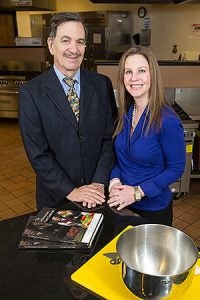Cookbook takes aim at inflammation
A pair of East Carolina University professors have published a cookbook with recipes that aim to curb inflammation and its related health complications.
Dr. Kimberly Myers, a registered dietitian nutritionist and associate professor of nutrition science, and Dr. William Meggs, a physician, toxicologist and professor of emergency medicine, are authors of “The Inflammation Cure Cookbook.” It’s a follow-up to Meggs’ 2004 book, “The Inflammation Cure,” which explains the connection between inflammation and heart disease, arthritis, Alzheimer’s disease and other maladies.

Drs. William Meggs and Kimberly Myers pose with copies of their new cookbook. Photos by Cliff Hollis
In the new book, Myers and Meggs present recipes designed to promote health and reduce the risk of heart attacks, strokes and other diseases related to inflammation. It also has nutritional information and updates many of the recommendations found in the first book.
“It’s really a wellness cookbook, which distinguishes it from common cookbooks,” Myers said. “This cookbook provides healthy lifestyle suggestions that are easy to follow.”
By adding key foods to the daily diet, such as salmon and other fatty fish, nuts, green tea, and olive and canola oils, people can counteract the negative effects of the Western diet, according to the authors.
In addition, garlic, onions, apples, oranges and broccoli have strong health-promoting properties, the authors say. Since diet is only one component of a healthy lifestyle, they also discuss other ways to reduce the risk of diseases related to aging, such as staying active.
“Everything in here is based on solid science,” Meggs said.
Myers contributed most of the recipes. She said the most time-consuming part of the book was figuring out the amounts of ingredients since she mainly keeps her recipes in her head. While doing so, she added herbs and spices that have been shown to have significant anti-inflammatory properties. Friends and family tested the recipes and approved.
“If Kimberly wanted to change careers, she could be a gourmet chef,” Meggs said.
Sylvia Escott-Stump, an ECU faculty member, registered dietitian nutritionist and former president of the Academy of Nutrition and Dietetics, introduced Myers and Meggs and wrote the foreword for the book.
As evidenced by his past book, Meggs has an interest in the causes and effects of inflammation. Part of Myers’ dissertation was to create a cookbook full of recipes that focused on omega-3 fatty acids, which research has shown to provide numerous health benefits, including reduced risks of heart disease, diabetes and other diseases associated with obesity.
“This is a mission for us,” Meggs said. “As an emergency physician, I see the ravages of the American diet every time I go to work. With a third of our population obese and another third overweight … it’s going to destroy us if we don’t get a handle on it.”
The book is divided into four parts: anti-inflammation food choices, recipes, identifying foods that cause individual health problems or discomfort, and “Beyond What We Eat,” or other factors that contribute to inflammation and poor health.
Recipes cover vegetable dishes, pasta, salads, sandwiches, soups, chicken, fish and seafood, red meats, egg dishes and baked goods.
Myers and Meggs did all of the writing. Meggs’ wife, Susan, an ECU interior design faculty member, did the illustrations. Their son, Thomas, did the cover photography.
The paperback book is 269 pages, is priced at $18.99 and is published by AbbottPress. It is also available as a download for tablet reading devices.
Myers and Meggs will be at the Barnes & Noble store at the University Commons shopping center in Greenville for a book-signing Jan. 25 beginning at 2 p.m. Copies of the book will be available for purchase.
Study focuses on helping obese patients
East Carolina University registered dietitian nutritionist Kimberly Myers and emergency physician William Meggs are collaborating on a study that aims to educate emergency department patients about healthful food and lifestyle choices.
When patients come to the Vidant Medical Center emergency department with diseases related to obesity, Myers’ nutrition graduate students interview and counsel them. Patients who participate receive information about nutrition and wellness, and students follow up with them over several months to see if the patients have made suggested behavioral changes.
As of early this month, 93 of a planned 100 patients had enrolled since the study began last summer. Meggs and Myers hope to complete the study later this year, compile the results and use them to apply for a grant to fund a larger study.